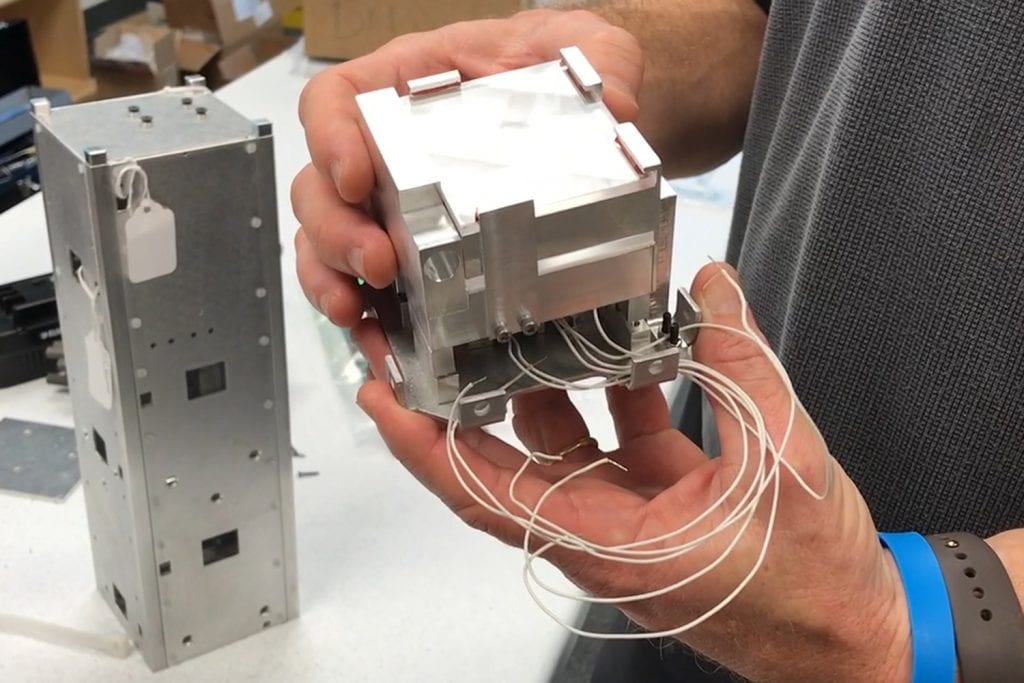Team Building Mini Satellite to Fly in Space in 2018

by Zenaida Gonzalez Kotala
A team of UCF researchers and their students is building a small satellite that will conduct experiments as it orbits the Earth next year.
The NASA-funded project code-named Q-PACE will help Physics Professor Joshua Colwell and his team better understand how planets form. The experiments involve marble-sized particles and what happens when they collide at low speeds in space. The project also helps UCF with one of its core missions – teaching students.
“We are always looking for ways to give students practical experience,” Colwell said. “Q-PACE is a unique opportunity because it gives students hands-on experience working with a space instrument as well as learning what it takes to work with a team. And the project isn’t just theoretical. Our experiments will give us valuable data to help us unravel the mystery of how planets formed in our solar system and around other stars. They are contributing to real science.”
Colwell knows real science. He has worked on a number of NASA missions, including the recently concluded Cassini mission that explored Saturn and its rings. His co-investigators – Assistant Professor Adrienne Dove and Florida Space Institute Research Scientist Julie Brisset – also have a lot of experience in the area of microgravity. They also share the desire to teach the next generation of scientists.
Trisha Joseph, an Orlando native, is planning on becoming a mission specialist for NASA after she graduates from UCF. She is majoring in mechanical engineering and was thrilled that Colwell took a chance on her.
“This is a great opportunity to learn hard and soft skills,” Joseph said. “When I started as a sophomore a lot of things were over my head, but working with other students and under Dr. Colwell I’ve learned so much. I received so much guidance and stuff they can’t teach you in school, like the etiquette of working on a professional team. I feel super blessed.”
She said she can’t wait to see the images beamed back from space once the experiments start running.
The cube satellite will perform more than 100 experiments and a high-speed video camera will capture all the action. Then the satellite will transmit the images by radio back to a ground station students are building at UCF. That’s added another layer of complexity to the project, said Doug Maukonen, a co-principal investigator. He is an engineer and research technician working in Colwell’s Center for Microgravity Research.
The students are also using magnets to create a lightweight and efficient attitude control system to keep the satellite oriented in the right direction while running the experiments. There are existing navigation systems the team could have used, Colwell said. But they would have been costly. So instead the team will build one and in the process learn how to troubleshoot by thinking outside the box.
The satellite will orbit the Earth for three to five years. At the end of its mission it will fall into the Earth’s atmosphere, burning up in the process.
Aerospace engineering major Jacob Hambur, of Ft. Myers, said he likes the pressure of a “real project.”
“School is good because it teaches you, but this is so much more because if you mess up here it’s on you,” he said. “You don’t want to be the guy who messes up and now your project is in space and it doesn’t work. The stakes are higher. I like that.”
This is one of two cube satellite projects currently being built at UCF, with Dove leading the SurfSat mission, also slated for launch next year. Maukonen said that one of the benefits of having students work on these projects is the skills they learn, which makes them attractive job candidates.
“I think we have a 100 percent track record,” Maukonen said. “We have our graduates working at places like NASA and JPL.”
